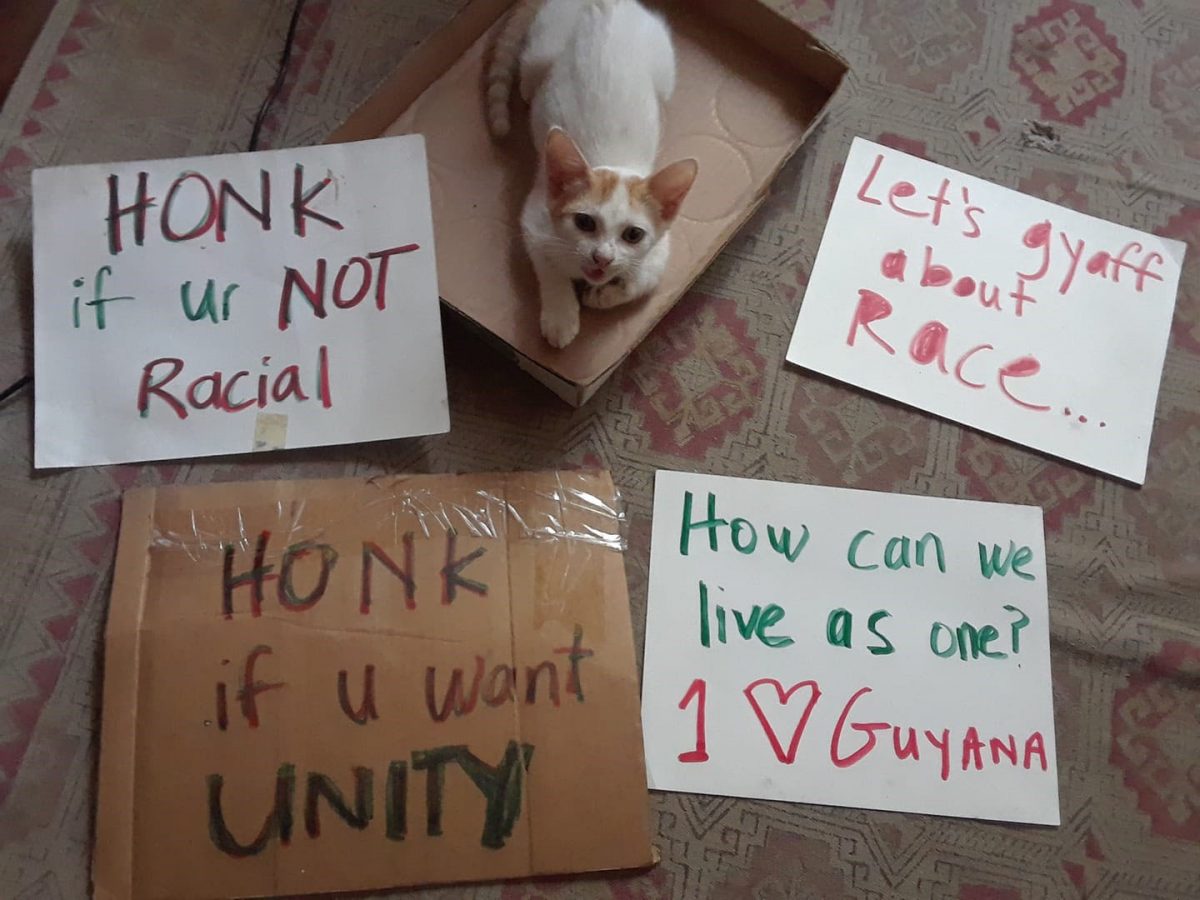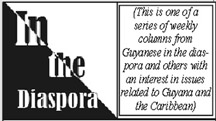Alissa Trotz is Editor of the
In the Diaspora Column
On Friday September 11th (birth anniversary of Andaiye, social justice warrior and co-founder of Red Thread), Red Thread invited all Guyanese to a virtual speakout streamed live on Facebook (you can view it on Red Thread Women: Crossroads Women’s Centre). In our announcement of the event, we joined all those calling for an end to violence, and extended condolences to the families and loved ones of Josh Henry, Isaiah Henry, Haresh Singh and Prettipaul Hargobin.
The speak out, Moving Forward Better, was meant to bring Guyanese together to reflect on what living together means and requires, the need to listen, hear and empathise with each other. To disagree without insult and slander, viciousness and bitterness. To care for each other and to demonstrate that in our words and actions. And to emphasise that silence is not an option.
Hosted by Karen de Souza of Red Thread, and opened by Nesha Haniff, who worked with Red Thread in the late 1980s and has recently retired from the University of Michigan, ten speakers were invited to briefly share their responses to two questions: How have you been affected by what is going on in Guyana? What do you want to see and what is one suggestion you would offer for how we get there? We all met virtually an hour before the event went live. Everyone was meeting someone new for the very first time. And everyone was hearing each other speak about this for the very first time. The speakers were Joy Marcus, Laura George, Karen Budhram, Renata Burnett, Susan Collymore, Andrew Campbell, Delon Moffet, Sherlina Nageer, one woman who did not want to appear on camera and another who did not have internet access in West Coast Berbice but who dictated her statement to be read.
In her closing reflection, Sherlina Nageer spoke about how difference – of race, class, gender, age, sexuality, ability – is used not to build us up, but to divide us, and called for us to meet each other, one on one, community to community, within and across villages. The next day, some took up Sherlina’s invitation to join her on market day in the village of Lusignan where she lives. Holding placards calling for a gyaff about race, they stood at the side of the road, inviting passersby into conversation. One young woman, Candacy Harvey, passing by from the village of Golden Grove, stopped to share a poem she had written:
Six races in one land and we should all be one
Too many cry, too many lives
It’s all too bright for our little one’s eyes
So
I block my ears
And cover my eyes
Just don’t see more youths like me die
I don’t know where or how to look
Don’t know how to play
Because the violence in the street is pushing me away
Protesting is right
Living in peace, love and unity is right
That’s why no more youths must die
Please be patient with me
‘Cause I really need you to come together as one
and fight for Black youth’s life.
We should all be doing this. At the speakout, Red Thread invited others to begin similar conversations, and to share pictures and those conversations with each other, and with others through social media. We need to multiply these stories of connection to overwhelm the toxic discourse of race that has threatened to engulf us all. These are not easy conversations, to be sure, but they are necessary and are ‘product and producer’ (those are Andaiye’s words) of the struggles for daily survival that should concentrate our energies.
Yesterday Guyana joined to mourn the farewell for Joel and Isaiah Henry, and we will stop again to mourn with the families of Haresh Singh and Prettipaul Hargobin as they are laid to rest. We close with the words that Red Thread offered at the ceremony held at Parade Ground, hosted with such grace and youthful dignity by Elsie Harry from the International Decade for People of African Descent Assembly – Guyana:
Red Thread joins you today, as mothers, grandmothers and aunts, to honour the spirit and memory of Joel and Isaiah Henry. To the families and loved ones of these young men who were taken so brutally and far too soon, there is a way in which we are speechless in the face of your sorrow and pain. We do not know that there are words we could offer that would bring comfort to you at this time. So we come with our hearts open to each other.
Twelve years ago, in the wake of a murderous attack on children, women and men in the village of Lusignan, Red Thread offered these words: “We hear calls for calm. We have seen expressions of sorrow and support. But it will not matter, it is cheap talk, all of it, if it does not begin with those who continue to pay the highest price of all. It is time we learn to listen to the anguish of a family’s cries, to recognize that their grief knows no race, no politics, no camp, only unspeakable loss and love. If we fail to recognize and reflect this in our responses as a community, as a people, then we have lost.”
Those who feel it most know it best. So let us listen to that anguish. We want to say today, amidst the deafening noise, that it is the families of Joel and Isaiah Henry who have offered the best lesson to all Guyanese. In your public statements you insisted that fighting against one another could never deliver the justice we should all be seeking for what was done to Joel and Isaiah, your children, these children of Guyana. Let us all remind ourselves and heed the call of Gladston Henry, father of Isaiah: “I am not supporting anything with violence and unmoral protesting. Do nothing with violence. I said leh we do it peacefully. It is our right but leh we do it peacefully.” Mr. Henry, in the midst of your own unimaginable grief, and determined to find justice in the name of these young sons of Berbice, you have offered the earliest and profoundest lesson of love to us all.







